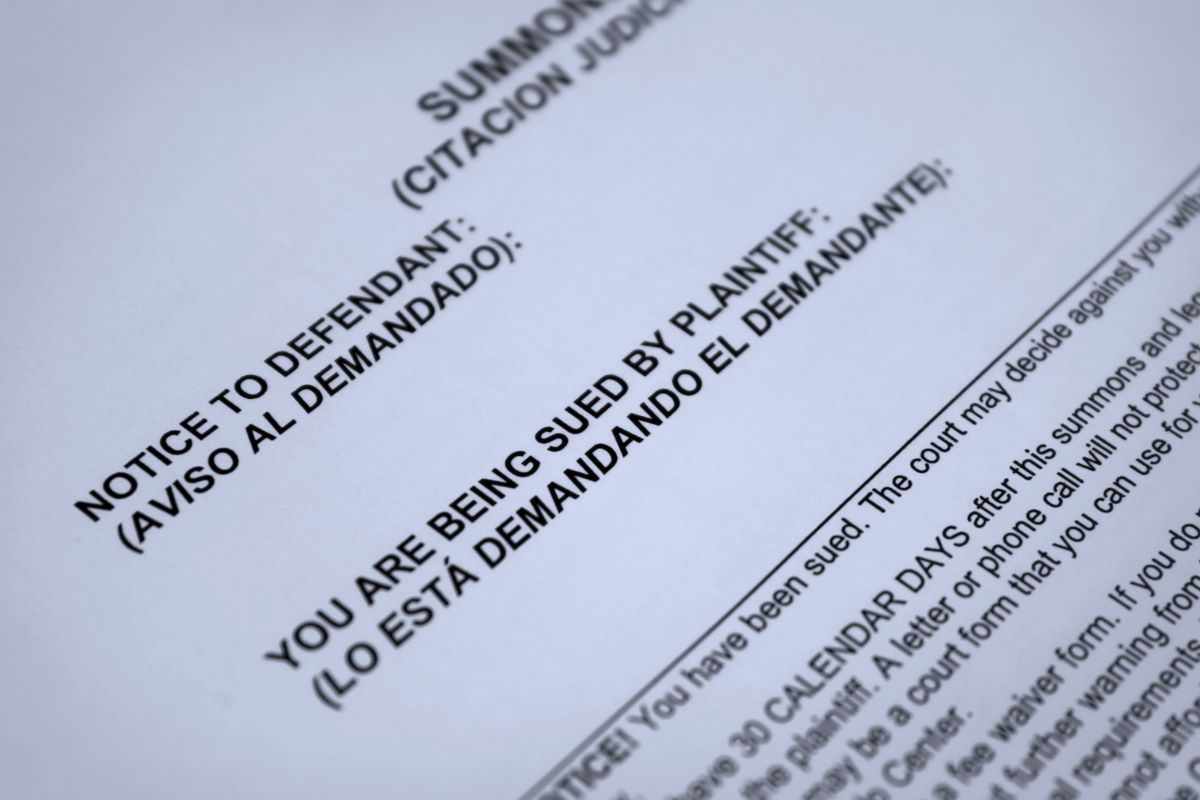Credit card lawsuits are a common occurrence in the world of consumer finance. If you’ve been served with a lawsuit by your credit card company, it’s important to respond promptly and appropriately. If the credit card company hired a debt collection agency the same is still true. Failure to respond can result in a default judgment. That leads to wage garnishment, bank account levies, and other legal collection methods. In this article, we’ll explain what credit card lawsuits are, why they’re filed, and how to respond to them effectively.
Understanding Credit Card Lawsuits
Credit card lawsuits are civil lawsuits filed by credit card companies against consumers who owe money on their credit card accounts. The credit card company is the plaintiff in the lawsuit, and the consumer is the defendant. Credit card companies file lawsuits for a variety of reasons, including non-payment, exceeding credit limits, and other violations of the credit card agreement.
When a credit card lawsuit is filed, the defendant is served with a summons and complaint. The summons is a legal document that informs the defendant that they are being sued and provides instructions for responding to the lawsuit. The complaint is a legal document that outlines the credit card company’s allegations against the defendant.
Consequences of Ignoring a Credit Card Lawsuit
Ignoring a credit card lawsuit is a terrible idea in most cases. If you fail to respond to the lawsuit, the credit card company can obtain a default judgment against you. A default judgment means that the court has ruled in favor of the plaintiff because you did not respond to the lawsuit. Once a default judgment has been obtained, the credit card company can take additional legal action to collect the debt, including wage garnishment, bank account levies, and property liens.
In Utah, most default judgments are collected by using wage garnishments. Some collection agencies and credit card companies also seize bank accounts and have the constables take your personal assets to sell at auction. These are serious enough consequences to answer the credit card lawsuit with care.
Reviewing the Lawsuit
If you’ve been served with a credit card lawsuit, the first step is to review the lawsuit carefully. It’s important to understand the allegations against you and the deadline for responding to the lawsuit. You may want to seek legal advice to help you understand the legal process and your options.
The summons and complaint are the two most important documents in the lawsuit. The summons will include important information such as the deadline for responding to the lawsuit, the court in which the lawsuit was filed, and the name and address of the plaintiff’s attorney. The complaint will include information about the credit card account, the amount owed, and the reasons why the credit card company is suing you.
Preparing Your Response
Once you’ve reviewed the lawsuit and understand the allegations against you, it’s time to prepare your response. There are several options for responding to a credit card lawsuit, including:
- Filing a motion to dismiss
- Filing an answer
- Filing a motion for summary judgment
- Negotiating a settlement
- Do nothing and let the court enter a default judgment
Filing a Motion to Dismiss
A motion to dismiss asks the court to dismiss the lawsuit without adjudicating it. You can file a motion to dismiss for various reasons. For example, if the credit card company has filed the lawsuit after the statute of limitations has expired, you may be able to file a motion to dismiss.
In addition to the statute of limitations, there are several other reasons why dismissal of a credit card lawsuit might be appropriate. Some common reasons include:
- Lack of standing: The plaintiff may not have standing to sue you for the debt if they cannot prove that they are the rightful owner of the debt.
- Improper service: The plaintiff must follow specific rules for serving you with a copy of the lawsuit. If the plaintiff did not follow these rules, you may be able to request a dismissal.
- Lack of jurisdiction: The court must have jurisdiction over the parties and the subject matter of the lawsuit. If the court does not have jurisdiction, you may be able to request a dismissal.
- Failure to state a claim: The plaintiff must allege sufficient facts in the lawsuit to support a legal claim against you. If the plaintiff fails to state a claim, you may be able to request a dismissal.
- Statute of Limitations: If the statute of limitations has expired your case should be dismissed.
The specific rules for requesting a dismissal may vary depending on your state and the court where the lawsuit is filed. Therefore, it’s important to consult with a lawyer or seek legal advice to determine the best strategy for responding to the lawsuit.
Filing an Answer
Filing an answer is the most common way to answer a credit card lawsuit. It is not always the best but is most common. An answer is a legal document that responds to the allegations in the complaint. The answer should include a denial or admission of each allegation in the complaint, along with any affirmative defenses you may have. Affirmative defenses are legal arguments that may excuse or mitigate your liability for the debt.
When preparing your answer, it’s important to follow the court rules and procedures. You may want to seek legal advice to help you prepare your answer and ensure that it complies with the court’s requirements.
Negotiating a Settlement
Negotiating a settlement is another option for responding to a credit card lawsuit. If you are unable to pay the full amount owed, you may be able to negotiate a settlement or payment plan with the credit card company. A settlement is an agreement between you and the credit card company in which you agree to pay a reduced amount to satisfy the debt. Some credit card companies will take monthly payments while others will want a lump sum.
Doing Nothing
In some very rare cases doing nothing and letting the court enter a default judgment is an appropriate plan. I cannot stress enough that this is not appropriate for most cases. In most case you should answer a credit card lawsuit. This is because a default judgment means that you did not respond to the lawsuit, and as a result, the plaintiff automatically wins the case. This can lead to serious consequences, such as wage garnishment, property liens, and damage to your credit score. Allowing a default judgment can have long-term consequences, such as making it more difficult to obtain credit or secure employment. Therefore, it’s important to carefully consider all of your options and seek legal advice if you’re unsure about how to proceed.
Filing for Bankruptcy
Filing for bankruptcy can be a good option for answering a credit card lawsuit in certain situations. For example, if you are facing overwhelming debt and cannot afford to pay the debt owed to the creditor who filed the lawsuit, bankruptcy may be a good option. Filing for bankruptcy can discharge certain debts and provide relief from creditor harassment and legal action.
Filing for bankruptcy also provides you protection from wage garnishment and other collection actions. Bankruptcy law provides an automatic stay that temporarily stops these actions.
Bankruptcy can provide an opportunity for a fresh start financially. It can help you eliminate or restructure certain debts, allowing you to start over and rebuild your credit.
Despite the benefits, filing for bankruptcy is a serious decision that should not be taken lightly. Bankruptcy can have long-lasting consequences on your credit and financial future, and it may not be the best option for everyone. It’s important to consult with an attorney or financial advisor to understand your options and the potential consequences of filing for bankruptcy.
Responding to the Lawsuit
Once you’ve decided how to answer a credit card lawsuit, it’s time to take action. If you choose to file a motion to dismiss you must do so before the deadline stated in the summons and follow the court’s procedures for filing the motion. This must also be done before you file any answer. Some websites incorrectly advise you that you file your answer before the motion to dismiss but that is categorically wrong. You must file a motion to dismiss before you file any answer.
If you choose to file an answer, you must do so before the deadline stated in the summons. You must also serve a copy of your answer on the plaintiff’s attorney. This is important. Your answer is not properly filed until filed with the court and serve it on the plaintiff’s attorney.
Possible Outcomes
After you answer a credit card lawsuit, there are several possible outcomes:
- The case may be dismissed if the credit card company does not have a valid legal claim against you.
- The case may go to trial if the credit card company disputes your response.
- You may be able to negotiate a settlement with the credit card company.
- The court may grant a default judgment if you fail to respond to the lawsuit.
It’s important to understand that every case is different. The outcome will depend on the specific facts and circumstances of your case.
Conclusion
If you’ve been served with a credit card lawsuit, it’s important to respond promptly and appropriately. Ignoring the lawsuit can result in serious legal consequences, including wage garnishment and property liens. By reviewing the lawsuit carefully, seeking legal advice if necessary, and responding to the lawsuit in the appropriate manner, you can protect your legal rights and potentially resolve the debt on favorable terms. Remember to always follow court rules and procedures and seek legal advice if you’re unsure about how to proceed.

